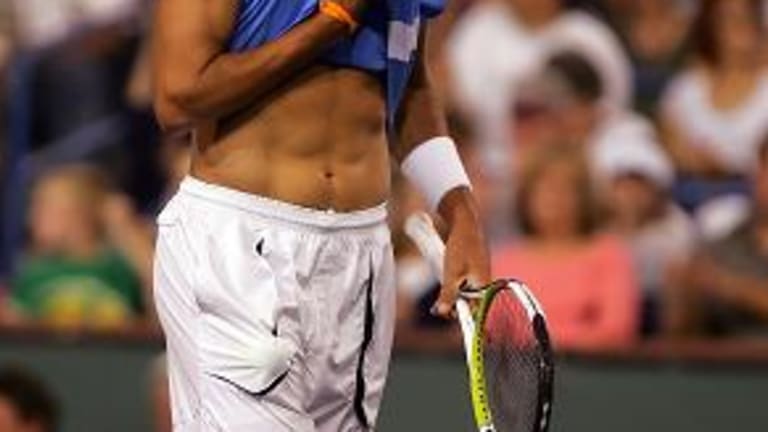Let's take them in order.
The match was a 7-6, 6-4 affair - nobody would call it a blowout, but British reporter Richard Evans (The Observor) put his finger on the real issue at play when he observed, with painful bluntness: asked Andy: "He looks good. He's got a game but he doesn't win that much, does he? Why. What holds Lopez back from being a better player than he is?"
It seems too obvious a question, of course, but it underscored an intriguing and not easily defined reality. You just know that some players are always going to fold up their tents at crunch time. How can a guy like Lopez can manage to be so good (the guy is, after all, No. 80 or so in the freakin' world) and get so far along the career trail, but end up looking so painfully ill-equipped to handle the stress of a match against a fine but certainly not unbeatable rival, in a situation (second round) where there isn't all that much riding on the outcome?
This was just one of those matches where it seemed the results was pre-ordained; I half-expected the guys to be doing a "wink, wink" thing on changeovers. Okay, Feli, you give them a few more cross-court winners, I'll keep them awake by blowing a few easy volleys and getting in trouble on my serve now and then, and then I'll wrap it up and we can both get the hail out of Dodge. . .
Done deal, Andy!
Once again, in a game awash in first-serve statistics, angst over approaching cross-court or down-the-line, kicker vs. hard, flat one, we get a rude head butt from the 800-pound gorilla in the room: the ability to compete. It's the single greatest weapon - or liability - in the pro player's arsenal.
The presser was winding down when Robson, fresh off covering the start of the Iditarod dog sled race in Alaska, popped into the room. He apologized for bringing up a subject Andy might already have addressed in the round-table group interview of the other day.
"Slacking off?" Andy asked.
"I was up at the dogs in Alaska."
Andy looked baffled.
"Iditarod."
"You did what? You were with the dogs?"
"Yeah," Doug said.
"You're a dog reporter, too?. . . Come on, man. Come on, Rob. You're better than that, bro', I hope. . ."
Everyone laughed.
Doug asked, "Are you in favor of shelving the round-robin. . . without going any further with the experiment?"
Andy answered:
Ah, any questions?
Roddick was done with de Villiers and his grand vision of tournaments featuring draws nobody can possibly understand, featuring numerous matches in which both wins and losses achieve a bizarre equivalence on the irrelevance meter - if, that it, it's possible to measure equivalence among things that are irrelevant.
See what I mean?
Andy got up to go, but he came over to Doug and me just to say "Hi" and asked Doug just what he had been doing.
"The Iditarod. You know, the dogsled race. It's amazing," Doug said, with the passion of a dog man (he has a chocolate lab named Sophie), as well someone still coming down from an exhilarating experience. "These dogs are really pretty small, and they. . ."
"Oh," Roddick said. "Is that the race where - what is it they say?"
"Mush," I interjected.
"Yeah," Andy said, "I saw a special on that once on television."
Doug continued, aware that Andy was yanking his chain (something Andy is very good at). He was hellbent on pulling this sled to the finish line right here in the desert of Palm Springs.
"Mush," Andy said as he retreated to return to the player lounge. His words trailed behind, "Mush. . .mush. . .mush."
That left me and Doug to talk about Alaska and the Iditarod. Being a reporter. It's a dog's life.
